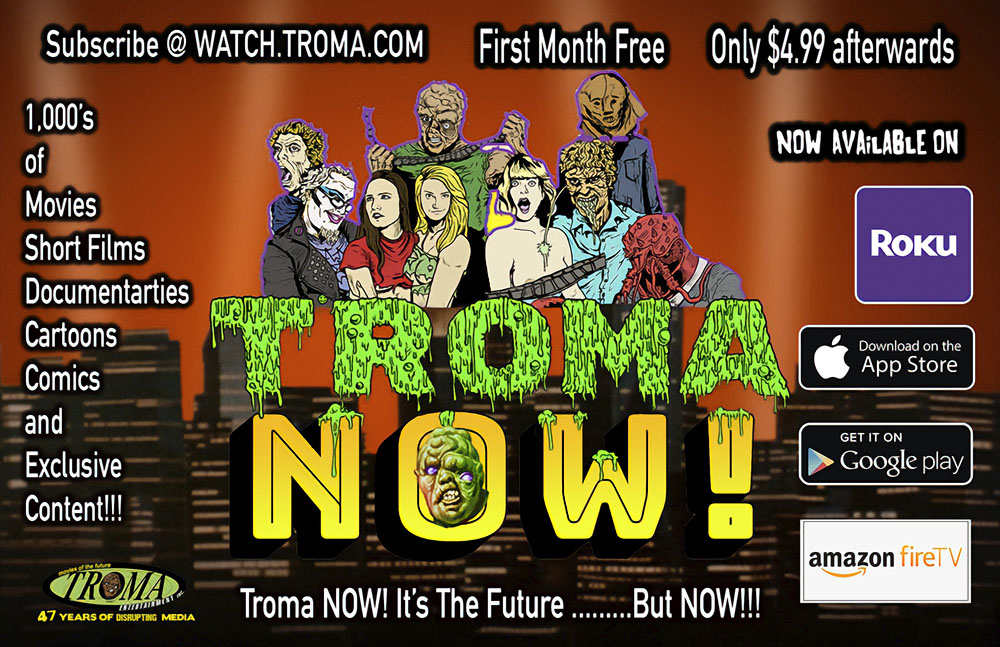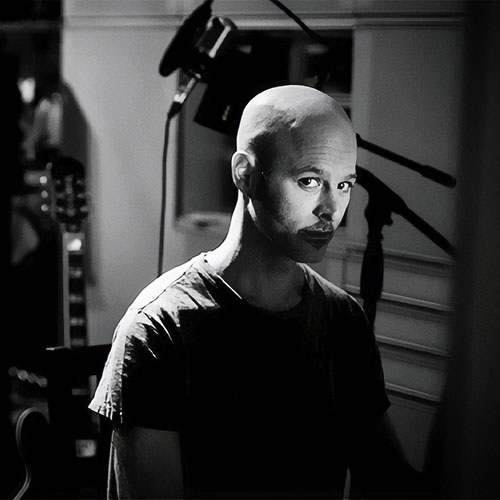It began with a clarinet solo of “This Land is Your Land” and ended with a scathing call-out of Film Festival parties that cost more than the big-budget Hollywood films they’re promoting. What happened in between? Everything.
Welcome to Tromaville
My conversation with Troma Entertainment creator and filmmaker Lloyd Kaufman was nothing short of extraordinary. And, if you’ve seen any of his films like The Toxic Avenger, Class of Nuke ‘Em High, Tromeo and Juliet, or Poultrygeist: Night of the Chicken Dead, then you’ll understand that expecting the unexpected comes with the territory when talking Troma.
To date, what has been your most memorable moment as a filmmaker?
It has to be when we were filming The Toxic Avenger. We have three rules of safety for forty-eight years at Troma Entertainment: “Safety to Humans and Animals”, “Safety to Peoples’ Possessions”, and, in smaller type “Make a Good Movie”. Nobody should get hurt or killed over something as stupid as a movie. Unfortunately, in the mainstream, it happens quite frequently.
In that vein, with The Toxic Avenger, when it comes to stunts, we hire people with resumes. We hired people with real Hollywood resumes. We had a stunt with a car flipping over and landing on its roof. We hired top quality talent. The guy who put in the roll bar did not attach it to the body of the vehicle but the floor of the car so when the car flipped over and landed on its roof, the two ends of the roll bar when through the roof of the car like a straw through the wet bag. Luckily, nobody was injured. The car got crushed and looked like an accordion. We had to bring in the jaws of life to get the stuntman out, but luckily, he was fine. That was the closest we’d ever come to someone getting injured and we’re very vigilant about that.
We’re also vigilant about respect for the camera. We had a kid — he was an NYU student — and he put the camera on the floor. I made him cry. A movie camera should be looked upon with reverence.
Who has been your favorite celebrity cameo in one of your films?
Well, I was friends with Stan Lee for fifty years. He and I wrote scripts together and he was a big fan of Troma. He’d have me moderate his panels at these conventions. I’d do a panel and two people would show up. He’d do a panel and two thousand people would show up so he helped me get a lot of exposure. He was in about ten of our movies.
John G. Avildsen, who was one of my mentors and the director of Cry Uncle! Which is on our new streaming service Troma Now, was a big inspiration to me. He is in a satire we did on infomercials.
From Trey Parker to James Gunn — and certain stars who had to use other names so I shouldn’t mention them… Lemmy from Motorhead and I had an interesting relationship. We were pretty good friends and he was so eccentric. I think my favorite cameo of Lemmy was when he played the President of the United States in Return to Nuke ‘Em High and Return to Return to Nuke ‘Em High. I wish he had been President. He was a student of war history and he wouldn’t have gotten us into all these messes and we would have had some good White House music. In Tromeo and Juliet, he played the narrator. He has more lines than Tromeo or Juliet or any of the main characters. You can’t understand him but it’s in the movie nonetheless. Later on, we started using subtitles for Lemmy. He was a good guy. A very nice man. He pretended to be gruff, tough, and scary but he was just a good dude.
Who are your biggest inspirations?
I came upon a film career because I was stuck in a very small bedroom with the guy who ran the Yale film society when I was going to Yale. He and his cohorts were big auteur advocates, and they had a big stack of Cahiers du Cinéma, which is a French magazine. Since I’m an entitled bourgeois, I can speak and read fluent French, so I started reading these magazines which nobody read and I got very inspired toward being a filmmaker who has total control of the soul, heart, and brain of the movie. That was a big influence on my decision to stay in New York. My biggest inspirations were directors who were journeymen and not bought and sold by the studios.
Charlie Chaplin, Buster Keaton, Stan Brakhage — the greatest visual artist of my lifetime in my humble opinion, — Fritz Lang, Mizoguchi, those kinds of names were the biggest inspirations. Tarantino is a genius and a big Troma fan too. Al Goldstein was in a couple of our movies, and we were kind of friendly. He made a movie called “It Happened in Hollywood”, which was a porno film that was not at all erotic. It wasn’t very good. I only saw it six times. For those of you who don’t know, Al Goldstein was a big pioneer of the first amendment. He edited a tabloid called Screw Magazine and was constantly busted and went to jail for writing obscene articles and showing pictures. And look at the internet now. This poor bastard. It ruined his life!
And meanwhile it turns out that the first amendment is still at risk — especially if you’re an independent movie company. You’ll get kicked off YouTube and Amazon for things that are perfectly acceptable from major studios. Censorship is economic censorship so that there are no independent studios left that can survive except Troma. The mainstream media ignores independent and the name “independent” has been corrupted. What Troma does is we make our own damn movies, distribute our own damn movies, and our fans help us. I think we’re the last independent studio of any longevity. I will leave behind a legacy of hundreds if not thousands of talented filmmakers and movies.
What would you say is your all-time favorite film?
Well, it’s hard to rank movies and I don’t like to rank art, but I would say my most intense experience was when I probably just getting out of Yale around the time I graduated. My roommate was a big advocate of Mizoguchi. He called Mizoguchi “the John Ford of Japan” but it was probably the other way around. I saw Princess Yang Kwei Fei on the big screen. It was quite a religious experience. Very sublime.
The movie that put my head in the decision that I would make movies as my life’s avocation was Ernst Lubitsch’s To Be or Not to Be, a movie which is Daoist which is what I majored in. I majored in Chinese studies and Daoism teaches a bifurcated universe where opposites are attracted to each other. You cannot have good without evil. You cannot have beauty without ugliness. Pain and pleasure are always together. To Be or Not to Be is totally crazy yet it’s absolutely controlled filmmaking. It’s both. And that’s the way I make movies: they’re totally uncontrolled yet totally controlled. Although they don’t look controlled at all, there is a hell of a lot of control, huge amounts of preparation. Much more than any Hollywood movie. That’s why most of these movies stink: there’s no rehearsals or preparation. And I’ve seen it because I’m in a lot of these big-time movies doing cameos. Anyway, Ernst Lubitsch’s To Be or Not to Be is the movie that pushed me over the line. I decided right then and there whilst I was watching that movie that to make it my life.
What do you think of the remake of The Toxic Avenger?
When we made The Toxic Avenger, no theater would play it. They didn’t get it. It wasn’t a horror film, it was something new and different. Initially, we couldn’t give it away and now it’s become hundreds of products and now there’s a musical that played Broadway for a year. It was in the West End twice and the musical is still traveling. It was written by David Bryan of Bon Jovi and Tony Award-winning Joe DiPietro. It got all the off-Broadway awards in New York.
And now it’s being remade with a huge budget starring Peter Dinklage and directed by Macon Blair. The idea of “Toxie” as a little person is going to be terrific. It’s totally going to be Macon’s own movie. I’ve read the script. It’s better than the original and it will be R rated. I think it’s going to be great. I’m very confident.
What film would you consider to be a modern-day cult classic and what do you think makes a movie a cult classic?
What makes a good cult movie? Wow. I guess…I think “cult” to some extent is a movie that, in the fullness of time, becomes a favorite among a group of people not necessarily in the mainstream. What is a cult? It’s a narrowly shared philosophy I suppose.
Bloodsucking Freaks is a perfect example. I can’t imagine why we got involve with Bloodsucking Freaks. It was 1974 just when we began the company. The guy who made it had trouble with it so we took it over. He had a distributor that cut it and made it R rated when really it should have been X rated. So we took it back and we put everything back in and it has become a cult favorite. It’s very funny but it’s very misogynistic. It’s too much in my opinion. The movie is now almost fifty years old but today we wouldn’t have acquired it. I can see how people object to it and why there was picketing. To me, though, Pretty Woman is infinitely more misogynistic and evil because it’s cloaked in a veneer of gold leaf whereas Bloodsucking Freaks has it all out there. And I think [Bloodsucking Freaks]is a great example of a cult film. It’s too much but it’s become a favorite.
I think one of my favorite cult movies is Fritz Lang’s The Big Heat. I met [Lang] a couple of times and I made him watch my first film. The poor bastard. I sent him a 16mm copy of The Girl Who Returned and he wrote me a very short letter afterwards:
Dear Mr. Kaufman,
Thank you for sending The Girl Who Returned. I watched it.
Best,
Fritz
What are your thoughts about The Suicide Squad directed by your collaborator James Gunn?
The Suicide Squad is a very good movie. Actually, every review of that movie mentions Troma now. Before The Suicide Squad, none of the PR firms would list Tromeo and Juliet, which is certainly better than anything James Gunn has produced. The movies he wrote and directed are brilliant. Now that the reviews [of The Suicide Squad] are coming out, the first line of every review mentions Troma. So that’s kinda nice. And James is great.
I heard you have a cameo in the movie as well?
I have a little cameo. You can’t miss me. And it’s a good movie. You can see the roots of Troma. It’s like Picasso built on Titian. James has come into his own. His movies are great.
What do you think is the future of cult film in a post-COVID world?
I think there will always be cult movies if not now more than ever. The good part of artist life is that you can make a movie now for nothing. When I was a child, everybody wanted to write the great American novel. Now everyone wants to make the great American movie. And now, thanks to a miracle, movie making has been democratized. We have a movie by a Canadian guy called Father’s Day and it’s just as good as any movie we’ve made if not better. And it was made for much less than $50,000. We put in some money and some investors put in some money and we produced it. But it was made for very little and the Canadian government supports its cult and independent filmmakers so I think you will see more cult films coming out of Canada. The American government only supports the giant media conglomerates through tax incentives and sophisticated shenanigans.
Do you have any upcoming projects you’d like to discuss?
The Troma Now app is available on Roku, Google, Apple TV. Whatever you want to see your movie on, the Troma Now app enables it. So you can get amazing cult movies. You get all the Troma classics. All the movie’s we’ve made in-house are available on the app. Even Trey Parker’s Cannibal: The Musical is available. When first released it, it was too ahead of its time. Nobody wanted it. But now it’s one of our most successful movies thanks to Blu-Ray, DVD, VHS, and of course Troma Now. Because Troma Now is the future.
We also got a whole bunch of social media links to pass along, so we will. Clearly these fans tend to be a pretty social bunch. … Instagram has both a Troma Team and a Tromo Now option. Twitter has Troma Team, Troma Now, in addition to a specific Lloyd Kaufman option. If you cannot find them, you are not looking very hard.
























